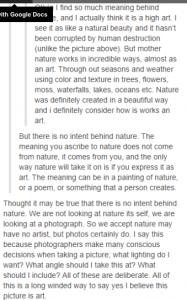The Tumblr Experiment, Part 3: Blogging as Formative Assessment
This is part 3 in a series. Parts 1 and 2 explored the in-class use of Tumblr, a blogging platform, as an exercise in writing for an authentic audience. You can read part 1 and part 2 online.
 As the Tumblr experiment progresses, I’m faced with a difficult question about evaluation and feedback: What is a good measure of a writer’s success?
As the Tumblr experiment progresses, I’m faced with a difficult question about evaluation and feedback: What is a good measure of a writer’s success?
The answer, I believe, lies in whether a writer has achieved his or her purpose. This approach forces my students to really think about what they’re trying to accomplish. Yes, I get the obvious student response: “Trying to get an A.” But as we move deeper into the experiment, I’m finding that students are beginning to see other possible purposes. Tumblr is a space in which they can deliberately pursue an idea in writing. It’s also a place to take risks, both in what we think and how we want to write. Still, how do I encourage risks in writing without promoting ones that appeal to me?
This isn’t easy territory for evaluation.
I want this to be formative, but I don’t want my students to write for me or for points. At the same time, I do want them to know that I’m watching, steering us toward writing a solid essay. That said, the essay is really just one aspect of this larger project, whose goal is to produce authentic writing and voices, while developing rhetorical dexterity.
Using their blogs as a lens on the class, we discuss what kind of writing students are noticing–reblogs and responses–and bring that back to the classroom, where we can talk about why certain posts are creating more action than others. We’ve begun to notice that success often comes down to the writer’s awareness of audience. One student, for example, blogged about a piece of music and was rewarded with a lot of attention and discussion. When we talked about it in class, the writer said that he knew that his friends liked music, and he was betting that if he could draw them in, he’d draw others with the same interest as well.
You can picture me clapping my hands, because isn’t this exactly how real writers–really anyone who produces any kind of product–think?
The students were all good writers. But as we talked through their writing choices, it became clear that some of these writers valued their own choices over those that appealed to their Tumblr audiences. Some prefered not to “cater” to the audience. This led to a discussion of different rhetorical moves that might attract a different audience–or alienate an audience.
For me, the real value lies in the conversation about purposes–whether, as writers, they’re achieving their purposes. That’s the rhetorical triangle in action, with real consequences.
As a formative task, this works to let me see how we’re doing without being intrusive. Is what I think I’m teaching actually sticking to my students? Did it show up in the writing? If it is, great, but if not, I can see it before the essays come in, make adjustments, and revisit topics. We’ve talked technique and SOAPs and audience, of course, but always as an abstraction, very rarely as a practical “thing” we do as writers, choices we make on purpose. It’s this pivot from abstraction to “real” that’s important with the Tumblr experiment.
By moving students students out of the static model of traditional instruction, and into an environment that has entirely new and changing demands, I’m looking for a way to change them from people who write for me into people who write more authentically. The feedback that they’re getting from their audience–each other and me–is more valuable because it’s authentic, connected to their own goals as writers, and is rewarded by people whose opinions they value–each other, not just me.
 Rick Kreinbring teaches English at Avondale High School in Auburn Hills, Michigan. His current assignments include teaching AP Language and Composition and AP Literature and Composition. He is a member of a statewide research project through the Michigan Teachers as Researchers Collaborative partnered with the MSU Writing in Digital Environments Program, which concentrates on improving student writing and peer feedback. Rick has presented at the National Advanced Placement Convention and the National Council of Teachers of English Conference. He is in his twenty-third year of teaching and makes his home in Huntington Woods.
Rick Kreinbring teaches English at Avondale High School in Auburn Hills, Michigan. His current assignments include teaching AP Language and Composition and AP Literature and Composition. He is a member of a statewide research project through the Michigan Teachers as Researchers Collaborative partnered with the MSU Writing in Digital Environments Program, which concentrates on improving student writing and peer feedback. Rick has presented at the National Advanced Placement Convention and the National Council of Teachers of English Conference. He is in his twenty-third year of teaching and makes his home in Huntington Woods.


